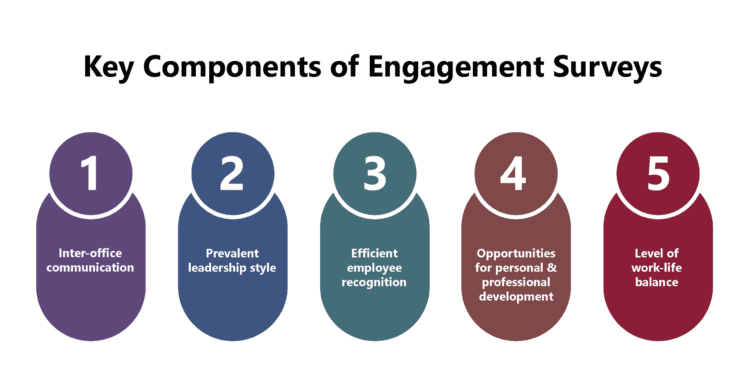1. Purpose of Employee Engagement Surveys: These surveys help organizations measure factors influencing employee performance and retention, providing insights into employees’ feelings and commitment.
2. Key Aspects to Assess: Effective employee surveys should evaluate inter-office communication, leadership style, employee recognition, opportunities for development, and work-life balance.
3. Benefits of Regular Surveys: Regular surveys offer ongoing insights into employee engagement levels, helping organizations address gaps and align employee goals with organizational goals.
4. Impact on Business Growth: Properly conducted employee engagement surveys can enhance engagement, leading to higher productivity and sustained growth.
Organizations often find it challenging to measure employee engagement, so employee engagement surveys have become important.
Many organizations do these surveys annually. However, in recent years, they have become more regular in most organizations.

Employee engagement has been primarily associated with employees’ happiness and satisfaction levels at the workplace.
However, it has been observed that even when employees seem happy and content, they might not be truly engaged.

Hence, employee surveys can be handy for understanding employees’ hearts and minds.
These surveys can help organizations measure the various factors that contribute to employee performance and retention.
It helps HR understand how employees feel about the organization and their commitment to it.
Most people perceive engagement surveys as another way to seek employee feedback about the various organization policies.
However, these surveys can help organizations learn about the views and opinions of employees about the organization and culture.
Through these surveys, they can understand the employee engagement levels and how to address the gaps.
Here are the critical aspects that organizations should focus on assessing through these surveys to enhance employee engagement:
1. Inter-office Communication
2. Prevalent Leadership Style
3. Effective Employee Recognition
4. Opportunities For Personal And Professional Development
5. Level Of Work-life Balance


Understanding the level and type of communication between employees and management can ensure better engagement.
An effective engagement survey can help understand if their employees are happy with the communication, both from the management as well as their peers.
Organizations can also understand employee concerns about two-way communication with management.

According to research conducted by Gallup, the leadership style prevalent in the organization impacts engagement quite significantly.
That is why engagement surveys should focus on understanding the leadership style existing within the organization.
They should help provide insights into how effectively leaders can convey the organization’s goals and values to employees.
In addition, they help to learn how to align individual employees’ goals with the organization’s goals.

Recognizing the efforts and achievements of employees in a proper and timely manner is critical to driving engagement.
Employee surveys can help gain information about whether or not the employees feel duly recognized and appreciated.
Surveys should offer an understanding of the satisfaction levels of employees with the acknowledgment and appreciation they receive.
It is advisable to conduct anonymous surveys to ensure the information acquired is unbiased and reliable.

Employee surveys should also focus on the opportunities for personal and professional development being offered to the employees.
This is one of the most significant contributing factors to keeping employees engaged and motivated.
These surveys should help organizations understand where they are lacking and what they are doing right.
Organizations can then use this to ensure employees’ adequate personal and professional development through various training programs.

Employees’ highly competitive and stressful professional lives significantly affect their personal lives.
That is why employee surveys should focus on seeking information on the work-life balance of employees.
The surveys should also provide insights into employees’ opinions concerning current strategies for improving work-life balance.
This can go a long way in helping organizations ensure better employee engagement and motivation.
Employee engagement surveys can prove to be highly effective tools for measuring and enhancing engagement levels. This can, in turn, lead to higher productivity and pave the way for sustained business growth.

Lead author: Sagar Chaudhuri, the Co-Founder and CEO of HiFives. He is an HR Tech Evangelist with over 25 years of corporate and entrepreneurship experience. In the past, Sagar has worked in leadership roles with companies such as Genpact, Infosys, and ICICI Bank. He has an engineering degree from IIT Kharagpur and an MBA from IIM Lucknow. Connect on LinkedIn
To stay updated on the latest HiFives blogs, follow us on Twitter (@MyHiFives)